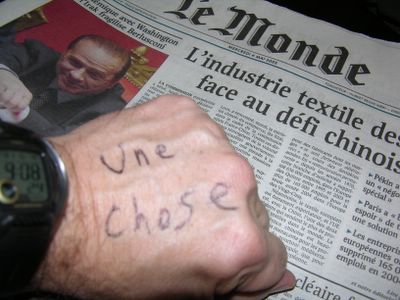Jean and other professors at L’Institut de Français often urge us not to obsess about getting every single noun’s gender correct. Is it “la” table or “le” table? If you’ve got your verb conjugations right, and you haven’t completely botched the placement of the pronouns, and you are pronouncing words accurately enough to be understood, the French will be glad to overlook occasional lapses in “le” or “la” and “un” or “une.” But if you are giving a 30-minute exposé on blogs, and you consistently get the gender wrong on a word you say over and over, you will drive even a patient professor to strong measures.
That’s what happened to me today.
By some quirk of brain circuitry, I had it firmly in my head that “thing” is a masculine noun. And apparently I say “thing” a lot when I’m speaking French, which is understandable given that there are a lot of things for which I don’t know the words yet. But alas, it turns out that “chose” is feminine. In his otherwise encouraging critique of my exposé, Jean estimated that I had used “chose” as if it were masculine approximately 20 times. “For the rest of the month, you may say it incorrectly three more times,” he informed me, “and I am asking the rest of the class to listen to you, even in the garden, and to report back to me each time you say this word incorrectly.” When I asked him what would happen after the third infraction, he smiled a dark, wolfish smile and said something vague which I can’t remember. Well, okay, it was a good gag to make an important point. But the error rattled me enough that I immediately wrote “Une Chose” on my left hand, and I intend to re-ink the reminder for at least the next few days.
Jean also said that I have developed a valuable habit of correcting myself while I am speaking. “This is the key to progress,” he said, “and it shows you are listening to what you say. You can become your own professor.” He said I have a strong base in pronunciation and verb conjugation, thanks to Cécile’s strong teaching last month, but that I need to expand my repertoire beyond the indicative past, present, and future tenses. My speaking in French is essentially “just the facts, ma’m.” Jean encouraged me to learn and to risk using the subjunctive and conditional tenses to add point of view, opinion, imagination, and emotion to my speech. This is precisely what he intends to teach us this month in Avancé I.


